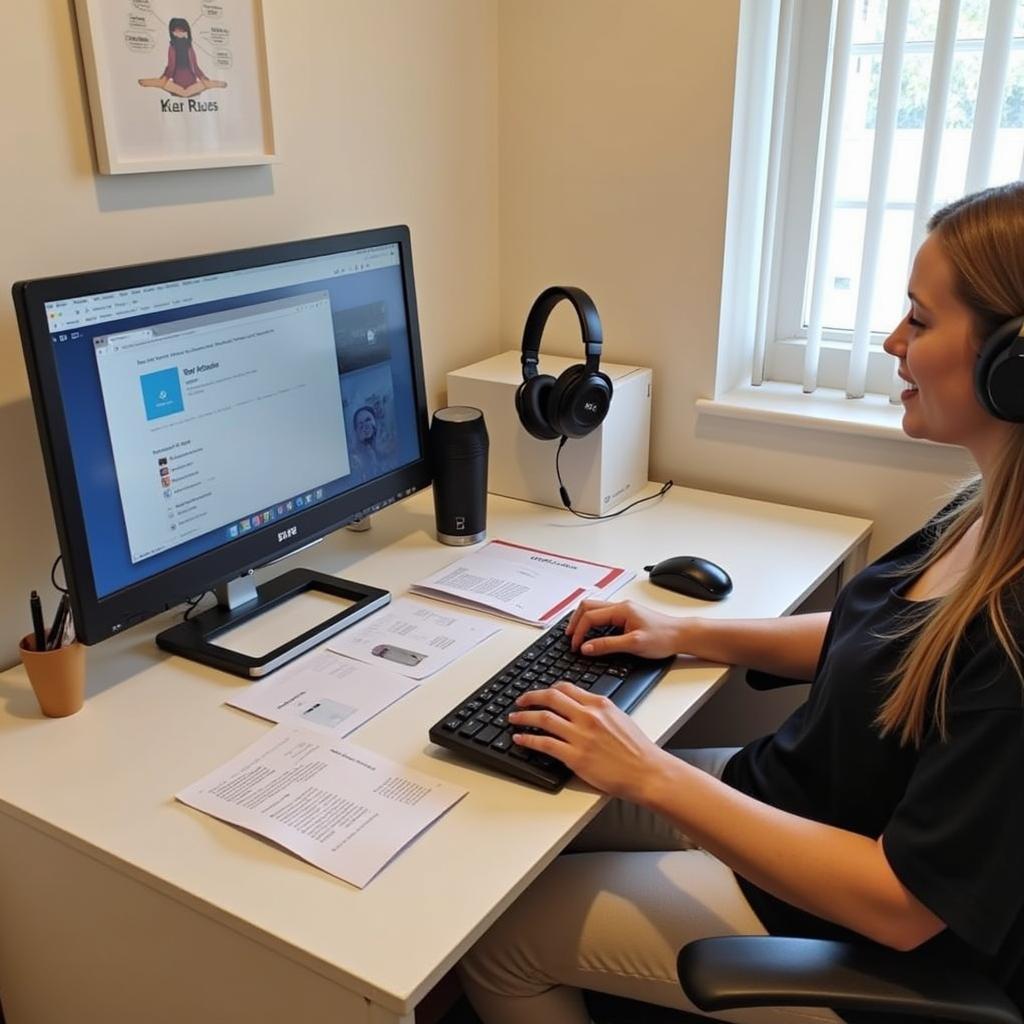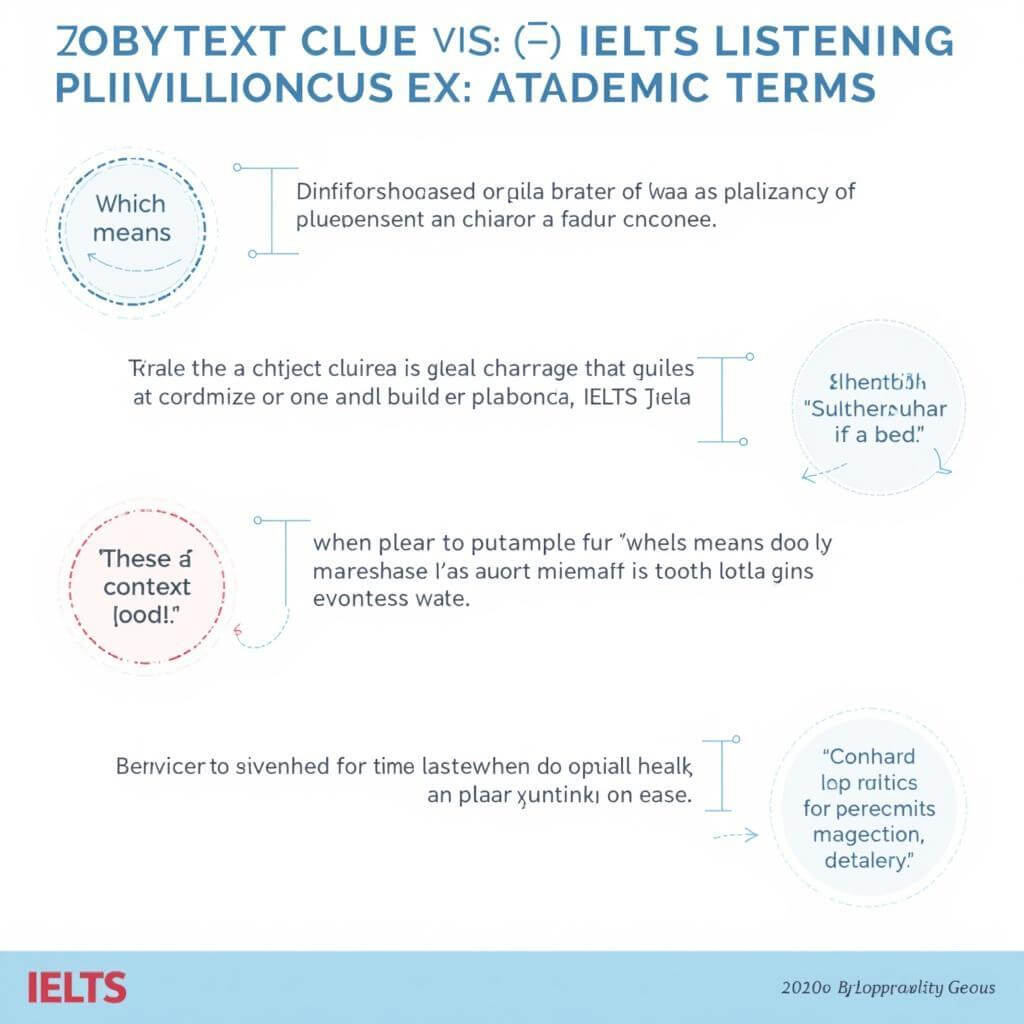Are you preparing for the IELTS listening test and looking to enhance your attention to detail? You’ve come to the right place. As an experienced IELTS instructor, I’ll share proven strategies for boosting attention to detail naturally, helping you excel in the listening section of this crucial exam.
Nội dung bài viết
- Understanding the Importance of Attention to Detail in IELTS Listening
- Why Natural Methods Work Best
- Practical Strategies for Enhancing Attention to Detail
- 1. Active Listening Exercises
- 2. Mindfulness Meditation
- 3. Memory Games
- 4. Descriptive Writing Practice
- 5. Audio Book Analysis
- Applying These Strategies to IELTS Listening
- Expert Tips for IELTS Listening Success
- Conclusion: Embracing Natural Improvement
- Frequently Asked Questions
- How long does it take to improve attention to detail for IELTS listening?
- Can I improve my attention to detail if I’m not naturally detail-oriented?
- How often should I practice IELTS listening to see improvement?
- Are there any specific foods that can help improve focus and attention?
- How can I stay focused during long listening passages?
- Is it better to practice with headphones or speakers?
- How can I improve my ability to understand different accents in IELTS listening?
Understanding the Importance of Attention to Detail in IELTS Listening
The IELTS listening test demands a high level of focus and precision. Every word matters, and even the slightest distraction can lead to missed information. By honing your attention to detail, you’ll be better equipped to capture key points, recognize subtle cues, and accurately answer questions.
Why Natural Methods Work Best
While there are many techniques to improve attention to detail, natural methods tend to be more effective and sustainable. They integrate seamlessly into your daily routine, making the learning process more enjoyable and long-lasting.
Boosting listening comprehension naturally is not just about test preparation; it’s a valuable life skill that will serve you well beyond the IELTS exam.
Practical Strategies for Enhancing Attention to Detail
Let’s explore some practical, natural ways to boost your attention to detail for the IELTS listening test:
- Active Listening Exercises
- Mindfulness Meditation
- Memory Games
- Descriptive Writing Practice
- Audio Book Analysis
1. Active Listening Exercises
Engage in active listening exercises daily to train your ear and mind:
- Listen to podcasts or radio shows on various topics
- Take notes while listening, focusing on key details
- Summarize what you’ve heard to a friend or family member
- Challenge yourself to remember specific facts or figures mentioned
2. Mindfulness Meditation
Incorporate mindfulness meditation into your routine to improve focus and concentration:
- Start with short 5-10 minute sessions
- Focus on your breath or a specific object
- When your mind wanders, gently bring it back to the focal point
- Gradually increase the duration of your sessions
Dr. Emma Thompson, a cognitive psychologist specializing in language learning, notes: “Regular mindfulness practice can significantly enhance one’s ability to concentrate on auditory input, a crucial skill for IELTS listening success.”
3. Memory Games
Engage in memory games to sharpen your recall abilities:
- Play “Kim’s Game”: Observe a set of objects for a minute, then cover them and list as many as you can remember
- Try online memory games focused on auditory input
- Practice remembering sequences of numbers or words
 Memory Games for IELTS Listening Practice
Memory Games for IELTS Listening Practice
4. Descriptive Writing Practice
Enhance your observational skills through descriptive writing:
- Choose an object or scene and describe it in detail
- Focus on small, often overlooked elements
- Practice using precise language to convey your observations
- Read your descriptions aloud and compare them to the actual object or scene
5. Audio Book Analysis
Use audiobooks to improve your listening skills and attention to detail:
- Choose books at your current English level
- Listen to short sections (5-10 minutes) without visual aids
- Write down key plot points, character descriptions, and setting details
- Check your notes against the written text to assess accuracy
Applying These Strategies to IELTS Listening
Now that we’ve explored methods for boosting attention to detail naturally, let’s see how to apply them specifically to IELTS listening:
-
Practice Active Prediction: Before each listening section, quickly scan the questions and predict possible answers. This primes your brain to listen for specific details.
-
Focus on Paraphrasing: The IELTS often uses paraphrasing in questions. Train yourself to recognize alternative ways of expressing the same idea.
How to listen for paraphrased information in IELTS listening is a crucial skill that can significantly improve your score.
-
Develop a Note-Taking System: Create a personalized shorthand for quick, efficient note-taking during the test.
-
Identify Question Types: Familiarize yourself with different question formats in IELTS listening, such as multiple choice, short answer, and matching.
How to identify multiple correct answers in IELTS listening is particularly important for achieving a high score.
- Practice with Background Noise: Gradually introduce background noise during your practice sessions to simulate real-world listening conditions.
 IELTS Listening Practice Environment
IELTS Listening Practice Environment
Expert Tips for IELTS Listening Success
Here are some additional tips from IELTS experts to help you boost your attention to detail:
-
Stay Calm and Focused: Anxiety can impair your ability to concentrate. Practice relaxation techniques to stay calm during the test.
-
Read Instructions Carefully: Pay close attention to instructions for each section, as they may contain crucial details about the listening passage.
-
Use the Time Between Sections Wisely: Review your answers and prepare for the next section during the short breaks provided.
-
Be Aware of Distractors: The IELTS often includes “distractor” information. Train yourself to distinguish between relevant and irrelevant details.
-
Practice Time Management: Develop a sense of timing to ensure you’re keeping pace with the audio and not falling behind.
Dr. Michael Chen, an IELTS examiner with 15 years of experience, advises: “Consistent practice with timed, full-length IELTS listening tests is crucial. It helps candidates develop the stamina and focus needed for the actual exam day.”
Conclusion: Embracing Natural Improvement
Boosting attention to detail naturally for IELTS listening is a journey that requires patience and consistent practice. By incorporating these strategies into your daily routine, you’ll not only improve your test performance but also enhance your overall listening skills in English.
Remember, the key to success lies in regular practice and a positive mindset. Embrace these natural methods, and you’ll find yourself more confident and prepared for the IELTS listening test.
Predicting content during listening is another valuable skill that complements enhanced attention to detail. As you continue to refine your listening abilities, you’ll discover that these skills reinforce each other, leading to comprehensive improvement in your IELTS performance.
Frequently Asked Questions
How long does it take to improve attention to detail for IELTS listening?
Improvement varies per individual, but consistent practice for 4-6 weeks typically yields noticeable results. Remember, it’s a gradual process, so be patient with yourself.
Can I improve my attention to detail if I’m not naturally detail-oriented?
Absolutely! While some people may be naturally more detail-oriented, everyone can improve this skill with practice and the right strategies.
How often should I practice IELTS listening to see improvement?
Aim for daily practice sessions of 30-60 minutes. Consistency is key in developing strong listening skills and attention to detail.
Are there any specific foods that can help improve focus and attention?
While no food guarantees improved attention, a balanced diet rich in omega-3 fatty acids, antioxidants, and complex carbohydrates can support overall brain health and cognitive function.
How can I stay focused during long listening passages?
Break the passage into smaller segments mentally, focusing on one section at a time. Use active listening techniques and take concise notes to maintain engagement.
Is it better to practice with headphones or speakers?
Both have their merits. Headphones can provide clearer audio and minimize distractions, but practicing with speakers occasionally can help simulate exam conditions.
How can I improve my ability to understand different accents in IELTS listening?
Expose yourself to a variety of English accents through podcasts, news broadcasts, and films from different English-speaking countries. Strategies for improving short answer questions in IELTS listening can also help you navigate accent challenges.


